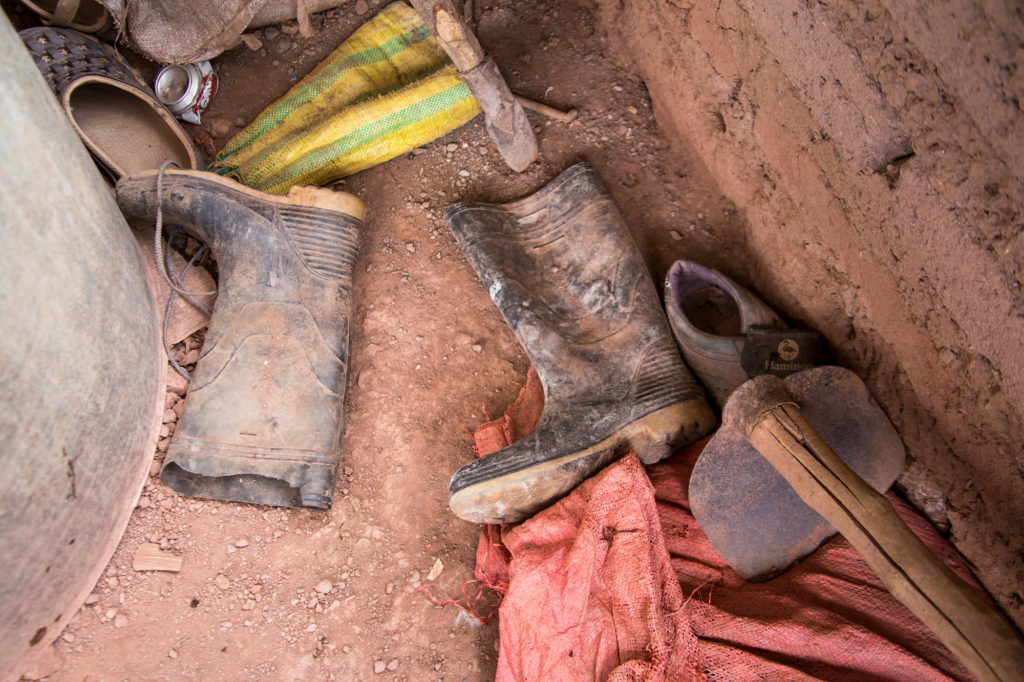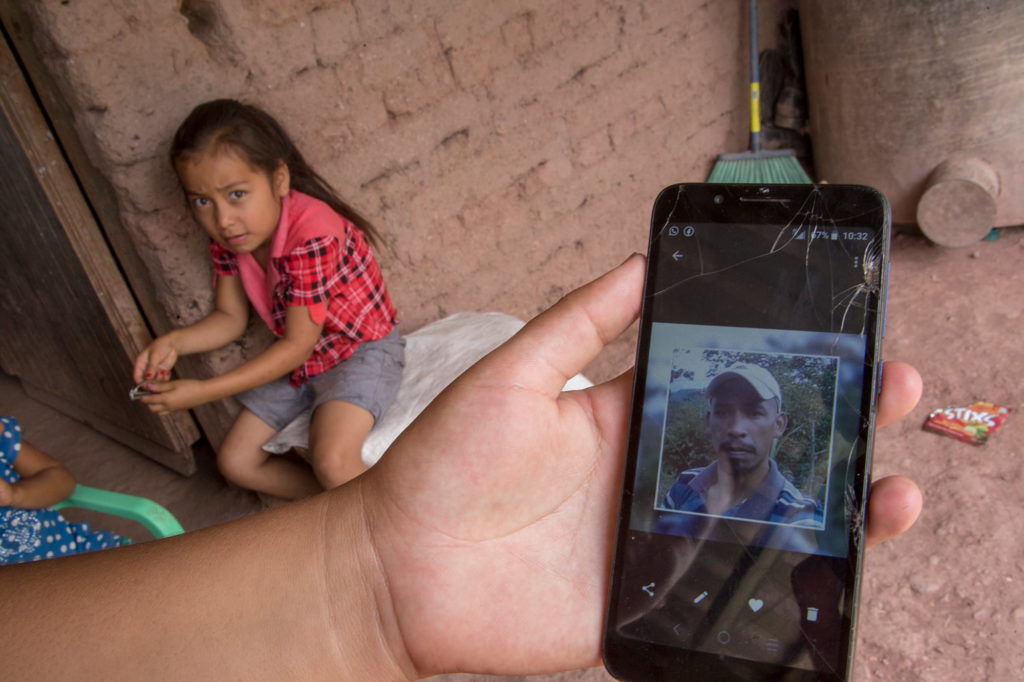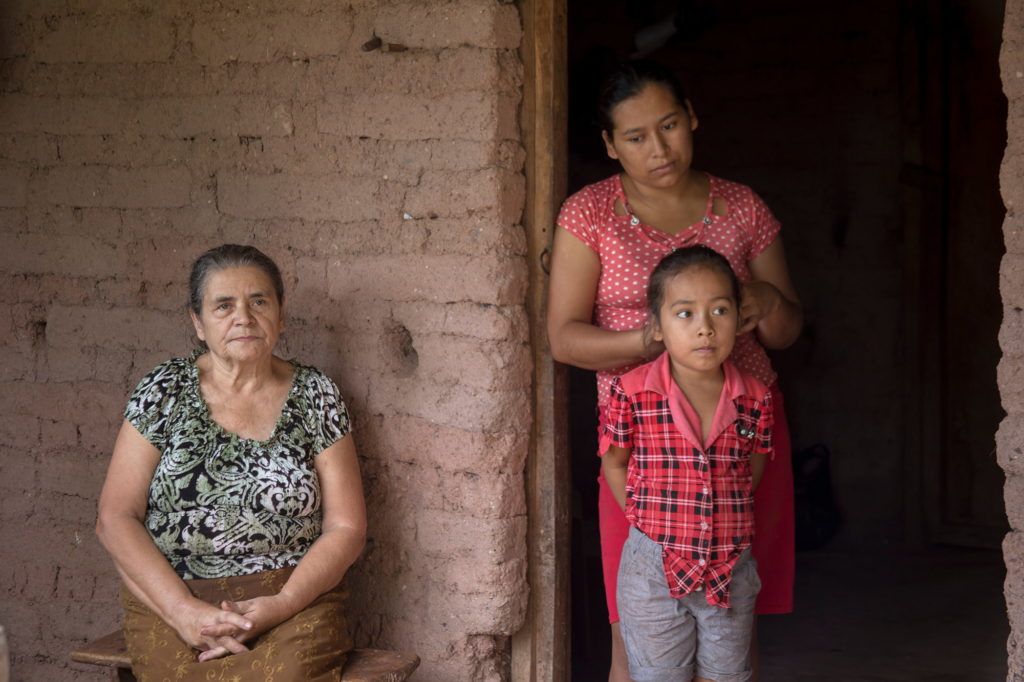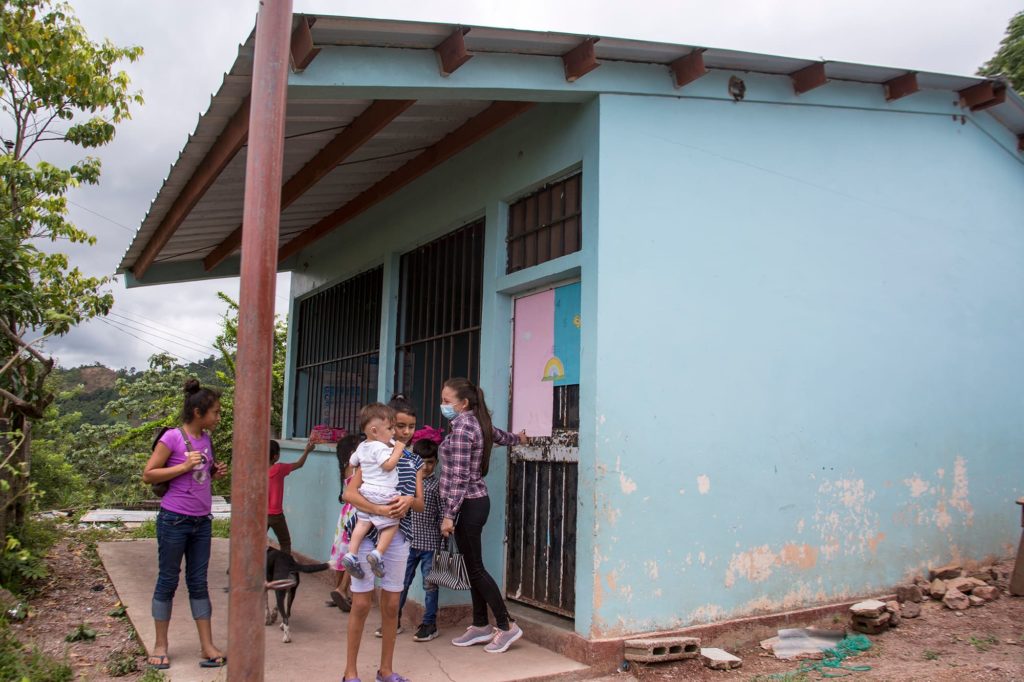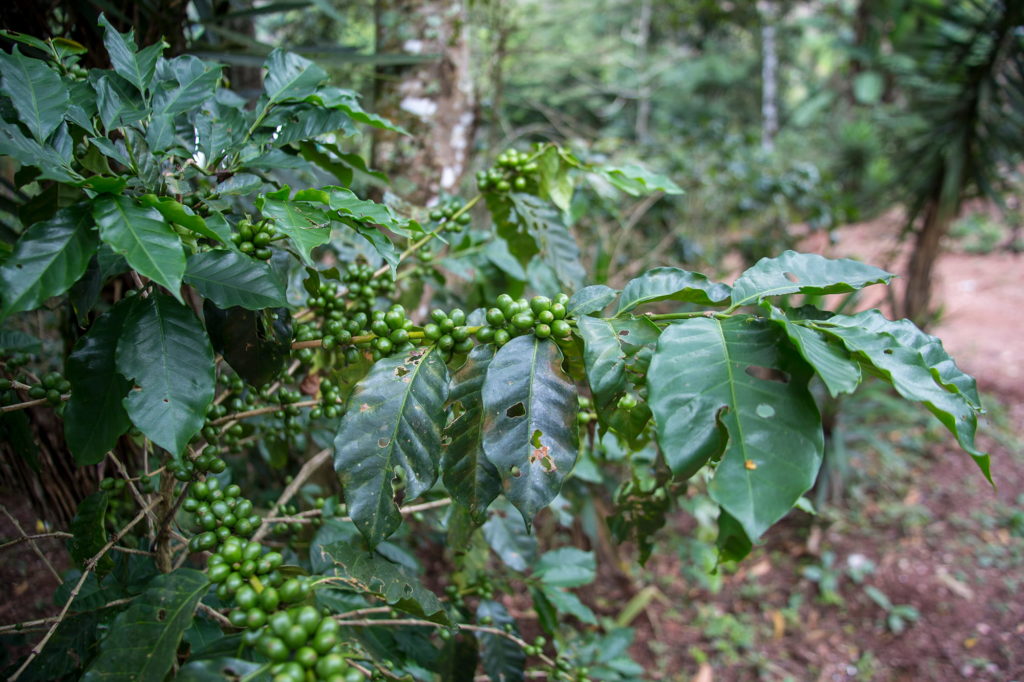A two-year-old Honduran boy was found abandoned in Mexico on June 28. He was traveling with his father, a 27-year-old farmer who was barely making ends meet back home. No one knows how they were separated. The child is back in Honduras while his father remains imprisoned in Mexico. “The face of poverty in Honduras is rural,” experts say, and Wilder’s story is proof of this.
By Allan Bu
Photos by Ezequiel Sánchez
Chilo was excited. He saw how his brother-in-law, after only eight months in the United States as an undocumented immigrant, earned so much money that he was able to make home improvements and buy some land to grow coffee. He even gave Chilo some work when he returned to Honduras.
Earlier in the year, Chilo and his wife learned that one of their neighbors in San Jose Miramar, Copan, had migrated to the United States with their youngest daughter and arrived safely in less than two weeks. He started to think about going north himself. On June 25, Chilo packed a small backpack of clothes for himself and his two-year-old son Wilder, and set out on the journey after asking for his mother’s blessing and his wife’s prayers. “I’m only going for five years,” he told his mother; enough time to work, save and climb out of lifelong poverty.
Chilo’s family was sad but hopeful when he left. Just three days later, his wife, Lorena, got a call from the Honduran consulate in Mexico. Her two-year-old son had been found in a trailer with at least 100 other undocumented migrants who were then detained by Mexican authorities. But no one knew anything about an adult accompanying Wilder.
It’s a moving story. Staff from the National Migration Institute (INM, in Mexico) found the child in a trailer on a highway in Veracruz, sitting on a pile of discarded clothing and food left behind by the other migrants. Wilder was hundreds of kilometers away from home and family, with his two little hands in his mouth.
In an April 2021 interview with the Los Angeles Times, Nelly Jerez, Honduras’ Vice Minister of Foreign Relations, acknowledged that migration of unaccompanied minors “has increased dramatically.” Jerez said that as of April, over 5,700 minors were housed in various Texas and California shelters, all of whom had arrived in the U.S. between February and April.
In Honduras, the family is not sure how Wilder got to Veracruz without his father. They haven’t been able to talk much with Chilo, whose real name is Isidro Ladino Garcia. He hasn’t given them much information except that he was detained in Tuxtla Gutierrez, the capital of the state of Chiapas, near the border with Guatemala.
Chilo was moved to another location by Mexican officials, and his family in San Jose Miramar hasn’t been able to talk to him for five days. In a brief exchange with one of his six siblings, Chilo said that he didn’t have time to explain the “huge screw-up” that had happened to him. His mother thinks that maybe he had fainted and wasn’t conscious when Mexican immigration officials were asking who was with Wilder.
“He’d get distraught when the kids asked him for toys”
The idea of going to the United States had been on Chilo’s mind for a long time, but when he saw how well his brother-in-law had done, the idea became a plan. “He was amazed to see what his brother-in-law did in only eight months. So he said, ‘I’m going. You can make good money there, obviously. See how he fixed up my house and yours too.’ But I wasn’t convinced,” said Rosa Julia, Chilo’s mother.
The whole family had heard about a woman and her child who had arrived safely in the United States after traveling only 15 days. That’s when they concluded that the rumors about how easy it was to make it to the “American dream” with minors were true.
In an interview with Contracorriente, anthropologist Amelia Frank Vitale said that the Biden administration was seeking pathways to legal permanent status for undocumented migrants and people with temporary protected status (TPS). “But that doesn’t mean an opening of the borders to new immigrants,” she said.
Chilo’s mother, Rosa Julia García, told us that an acquaintance had hired a trafficker to get to the United States. But after being caught and deported twice, he decided not to make a third attempt and gave his place to Chilo. “Let me go, Mom, it’s a great opportunity,” Chilo told his mother, who begged him not to undertake such a dangerous journey.
Chilo thought it was a good opportunity because traffickers charge US$8-11,000. This trip north with a trafficker was practically a gift. “When I get there, I’m going to send some money so we can both fix up our little houses. When I make enough to buy some land, I’ll come back,” he said to Rosa Julia. When she found out what happened to her son and grandson, Rosa Julia had a medical emergency related to her diabetes.
Chilo’s wife, Lorena, is a young woman who speaks in the pronounced accent of Western Honduras; her answers are short. Her daughter Abigaíl and a little cousin play in the corridor while we talk.
“We thought about it [going to the United States] because of all the poverty here,” says Lorena, acknowledging that they had both planned to go. “We had thought about it ever since we heard that they were letting minors into the country.”
Efrain Díaz Arrivillaga, an economist, says, “The face of poverty in Honduras is rural.” He acknowledges that Honduran cities have a different type of urban marginalization, but “rural poverty characterizes most of the country.” He observes a depopulation of rural municipalities resulting from migration to the cities or abroad, “The reality is that few people remain.”
The World Bank reports that in 2019, 14.8% of the Honduran population lived on less than US$1.90 per day. Further, almost half of the population lived on less than US$5.50 per day.
Also according to the World Bank, about 45% of households reported income losses in August 2020, which likely deteriorated further with the November hurricanes. Projections suggest that the population living under the US$5.50 poverty line could increase to 55.4 percent in 2020, resulting in more than 700,000 new poor people.
According to INE data, before the pandemic and hurricanes Eta and Iota, 59.3% of the Honduran population lived in poverty during 2019. In addition, 38% of Hondurans lived on one dollar a day or less.
A study conducted in January 2020 by the Inter American Development Bank and the World Bank showed that 38.4% of poor Hondurans live in urban areas and 60.1% in rural areas.
We spoke to Chilo’s family in an adobe home with a dirt floor, which is very common in rural areas. There are two plastic chairs to sit in. Chilo’s parents and two brothers live in three other houses nearby. The property has a few coffee plants, a mango tree, an avocado tree and some other fruit trees. Some pineapple plants were planted after Chilo left for the United States.
Lorena recalls how her husband would despair over the lack of work that prevented him and his family from living with dignity, “He would get very frustrated when the measly US$4 he earned would all go on two pounds of sugar and a bar of soap. All gone.”
Sometimes Chilo’s children, who do not fully understand the poverty they live in, would innocently ask him for things. “They started asking him for toys. He got very disheartened, but we never expected this” [Wilder abandoned and Chilo in jail in Mexico]. The family doesn’t know how the father and son were separated, but they do know that Chilo is having a very hard time in Mexico. Lorena said, “He called me on Tuesday, crying. He told me to ask for the child back because he didn’t know when he was going to return.”
The air is clean and fresh on that beautiful, desolate mountain. A rooster crows while we talk. Just a few meters away, Rosa Julia has just finished breakfast with her husband, Juan Ladino. She stares out at the horizon as she talks about her son, and sometimes lets out a heartfelt sob. “I didn’t want to let him go, but he kept saying, ‘I’ll work and send money to fix your house.’ I just said, ‘Son, I don’t care if the house falls down around me, I don’t want you to leave.” But Chilo left.
Rosa Julia has been diabetic for ten years. When she heard the news, she had to be taken to a doctor in Cabañas from the shock. “It was so sad. I couldn’t look at the photo of the child and a man who had suffocated, the one they said was my son.” A misidentified man had suffocated to death in the trailer where her grandson was found. At the time, Chilo hadn’t called and couldn’t be located.
She gets emotional and cries a little, moved by memories of little Wilder coming to wake her in the morning, “I love the little boy a lot. He would come over in the morning and wake me up. It’s been very sad.”
Rosa Julia doesn’t understand how her son got stuck in this nightmare instead of living the American dream, “So many people go there with children and arrive safely. I don’t know why this happened to my boy.”
San Jose Miramar
To get to San Jose Miramar, you can either walk or drive there in a 4×4; there is no other way. There are 70 houses and about 283 inhabitants who mostly grow coffee, corn and beans. There is no public transport and the rough road looks like a motocross trail. San Jose is one of 42 villages in Cabañas, Copan; a remote municipality in western Honduras. The area’s economy mostly consists of coffee growing, cattle ranching and dairy products.
Chilo and Lorena were both born in San Jose Miramar. They had their son, Wilder, two years ago. The focal point of the village is a small school with 42 students and two teachers. It has one classroom and another under construction.
Sardy Alvarado, a cheerful woman with green eyes, is one of the school teachers. She knows all about Wilder’s situation and says that it’s the first time something like this has happened in their community. But she tells us that in the neighboring village of San Antonio, the body of a young man who drowned while trying to get into the United States was recently repatriated.
Alvarado said that many people from San José and Copan have emigrated in recent years, but the numbers increased during the pandemic, “Most of the fathers of the kids I teach are over there [in the United States]. Only the mothers are still here.”
Alvarado surprises us with another piece of information. According to her records, only two of her 22 students still have two parents living in Honduras. The rest have emigrated in search of better opportunities, “Practically all of them have left. And it’s not just in this community. It’s happening everywhere. The number of parents who have left is very evident.”
Sardy says the lack of opportunity pushes people to leave the country because the few available jobs pay miserably. “Some couples have three or four children and earn only a few hundred dollars a month. They can’t even afford to feed their kids,” she says.
In 2016, an English organization named MoveHub conducted a global study on basic food basket costs. They found that Honduras is the most expensive country in Latin America for meeting food needs. Workers need to spend 100.54% of their weekly income to cover basic food needs.
In San Jose Miramar, coffee harvesting is one of the few jobs available, but it only lasts for two or three months. For the rest of the year, workers have no stable source of income.
Chilo was a day laborer and earned about US$4 a day when he was able to find work. He also grew a subsistence corn crop on rented land. Lorena said that they earn more during the coffee season, but the money goes to pay off debt accumulated throughout the year. “You get into debt all year long and then you pay it off after the harvest,” she says.
Rural exodus
Efrain Diaz Arrivillaga is an economist and former presidential candidate. He observes the increasing urbanization in Honduras and contends that this trend is the result of government neglect in building infrastructure and providing adequate health and education services in rural areas.
Young people are the biggest group leaving rural areas in search of opportunities that don’t exist in their villages. He says, “The western part of the country is where most people are leaving from.” Copan, where Chilo and Wilder were born, is bordered by Guatemala in western Honduras.
Diaz also observes how these neglected areas have participated in recent elections, “These areas have been abandoned, yet paradoxically they tend to vote for [the National Party candidates] because these areas also have the highest rates of illiteracy.”
This observation proved out in the 2017 elections, when Juan Orlando Hernandez was reelected in an unconstitutional election amid widespread allegations of massive vote fraud. In its defense, the National Party claimed that the rural vote had turned the tide in their favor, erasing candidate Salvador Nasrallah’s 5% lead, with 57% of the ballots counted. Nevertheless, Diaz believes that rural Honduras “is not on the national agenda and that the agricultural sector has declined significantly.”
Germán Perez Destephen, former Minister of Agriculture under the government of Ricardo Maduro, believes that rural poverty has several causes, “Agriculture is not the only factor producing rural poverty. There are a number of factors such as the lack of access to education and health services, malnutrition, little access to public services, limited income, lack of technical assistance, no access to credit, etc. It’s a vicious cycle.”
He also believes that an area’s capacity to produce wealth cannot be increased without the financial resources needed to create investment infrastructure, “Escaping poverty requires investment, and there is no investment because there is no ability to save money. This is one of the structural characteristics of underdevelopment.”
Perez said that the agri-food sector is the most important sector of the Honduran economy, and that it has great potential for development due to opportunities for production diversification.
“The agricultural sector currently contributes 14% of the country’s gross domestic product, over 70% of its exports, and 35% of its jobs,” said former minister, Germán Perez.
In November 2019, Executive Decree PCM 052-2019 included a US$166 million grant to the Honduran Armed Forces for agricultural development. This measure by the Hernandez administration was unprecedented and widely denounced. It is still unclear how the military used that money.
For young people to stay or return to rural areas, Perez believes that these areas must become a more attractive option by providing the services and employment opportunities that people can find in cities. There must be potential to prosper, access to decent employment, housing, quality public services, business opportunities, access to land, and more. “If there were better opportunities in our rural areas, so many people wouldn’t move away.”
Wilder Ladino, the little half-naked boy found alone in Mexico, is now back in Honduras. He was returned to Honduran immigration officials who later took him home to his family. Lorena is happy now, almost a month after Wilder was found abandoned, 1,300 kilometers away.
Back in the mountains of Copan, his family was overjoyed at Wilder’s safe return. But his father is still locked up in Mexico. His family doesn’t know when he’ll come home. Lorena García is resigned to staying in San Jose Miramar and fighting poverty. She says that after Chilo and Wilder’s experience, they won’t try again to leave. Distressed, she says, “We’re afraid now.”

